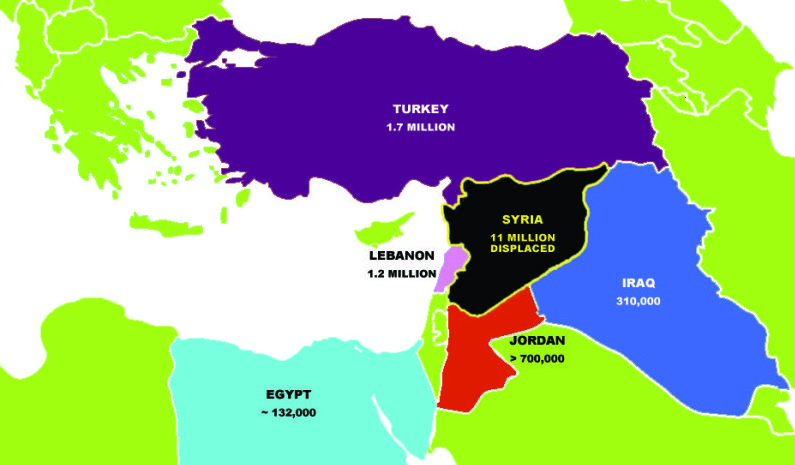
A majority of those fleeing war-torn Syria have found refuge in bordering countries. (Graphic by Erik Alexander)
Images of a drowned three-year-old Syrian boy — Aylan Kurdi — washed up on Mediterranean shores rippled across global media last week, throwing the long-neglected international refugee crisis into the spotlight. In the wake of the jarring image of the boy lying face down in the surf, pictures and videos of other refugees streaming across Europe have dominated headlines.
While the American media has finally taken up the plight of Syrian refugees, the United States government has yet to do the same.
The world is in its worst refugee crisis since the end of World War II, with more than 19 million international refugees having fled their home countries. More than four million of these refugees are from war-ravaged Syria, making it the largest current contributor to the global refugee population.
The international response to the refugees streaming from Syria has been mixed. Many of Syria’s neighbors have taken on a tremendous number of the refugees. Over half of those fleeing Syria have relocated to Turkey. Lebanon has taken more than 1.2 million refugees, a great burden for a country with a population of just over four million. And last week, Germany announced that it will be accepting 800,000 refugees this year.
The United States has yet to step up as these other countries have. The government has only accepted 1,500 Syrian refugees since the start of civil war in 2011. The Obama administration announced in August that it would take 8,000 refugees in the next year, but this is far short of enough. The International Rescue Committee, an Atlanta based nonprofit organization, has called on the United States to increase the number of Syrian refugees it takes in the next year to 65,000. Oxfam America and a group of 14 Democratic Senators have called for similar numbers.
The United States has by far the greatest capacity to take in refugees of any country in the world. The Office of Refugee Resettlement at the Department of Health and Human Services orchestrates a vast infrastructure for assimilating refugees run by partnerships with nonprofit-government partnerships. Since 1975, the United States has resettled more than three million refugees — more than any other country in the world — taking in 70,000 in 2013 and 2014.
Yet the United States government has resettled so few Syrian refugees because of concerns that the refugees may be connected to terrorist organizations. Under current policies, refugees are carefully vetted, a process often taking up to 18 months.
In May, Republican Congressman Michael McCaul, head of the Homeland Security Committee in the House of Representatives, said this in reference to Syrian refugees: “We have no way … to know who these people are, and so I think bringing them in is a serious mistake.”
Kentucky Senator and Presidential candidate Rand Paul was similarly skeptical that Syrian refugees may have terrorist connections in an interview last Thursday with BuzzFeed. Paul noted, “We do have to be careful with this, and we should have a warm and welcoming heart, but we also just can’t accept the whole world to come here.”
While terrorism is certainly a real concern, such claims reek of Islamophobia. There is no reason to assume that these refugees, driven from their homes by war, often at the hands of terrorists, are terrorists themselves. Justifying the denial of refugee status in the United States to these displaced Syrians on the remote, totally hypothetical possibility that they may have terrorist connections is a denial of the compassion for displaced people that this country was founded upon.
Since the Pilgrims landed on Plymouth Rock fleeing religious persecution in Europe, the United States has provided refuge for the world’s oppressed and displaced. After World War II, the United States took in more than 650,000 European refugees. We also took in many refugees from countries involved in wars and revolutions since World War II, including many from Cuba, Korea and Iran. These refugee groups have assimilated into American society, becoming some of the most successful ethnic groups in this country.
The United States should afford Syrians the same opportunity.
In the past week, glimmers of hope emerged that the United States will accept more Syrian refugees. President Obama praised Germany’s decision to step up to the moral plate and take refugees in. And now that the media is paying attention to the crisis, the American public may react with compassion. Then again, in this age of nativism and “all lives matter,” such a public response seems less than likely.
But there remains hope: When Donald Trump was asked if the United States should help Europe by accepting some refugees, he responded, “possibly, yes.” If the man who considers Mexican Americans “criminals, drug dealers and rapists” is decent enough to acknowledge that we should take in more Syrian refugees, hopefully more sensible politicians can reach the same conclusion.
Ben Perlmutter is a College senior from Chappaqua, New York.
Ben Perlmutter is a College junior from Chappaqua, New York majoring in Math and Political Science. In addition to being a staff writer for Editorials, he's involved with the Emory Journal of International Affairs, TableTalk, the Center for Law Politics and Economics and the Media Council.







Now why would anyone be worried about Islam? What a silly thought! {Sarc/off}
Ben, I don’t mean to be condescending, but what planet do you live on? Have you studied history? You certainly have not studied Islam or the sadistic and rapacious life of Islam’s prophet.
People are afraid of Islam because Islam is fearful. Islam IS a supremacist “religion”. It is said that Muslims have killed up to 70 million Hindus in their 1,000 year long jihad against southern Asia. Should Hindus not fear Islam? If they do is that what you call a phobia?
And what of the Buddhists? Once modern-day Afghanistan was home to millions of Buddhist, but today there is not one single Buddhist left living there and Afghanistan is 100% Muslim. How is that for diversity, Ben?
And what of the Animists of Sudan? Should they be afraid of Muslims and their religion, or is that being unreasonable on their part?
Ben, you are a Jew, no doubt. Hitler made no bones about wiping Jews off the face of the Earth and now the Ayatollahs do the same, but here you are defending today’s Hitlers. You are one a**-backwards kind of guy, Ben. But, I suppose what really matters these days is pretending to be open-minded even if it kills you, and you get an A+ in that class.
Ben,
Why won’t the filthy rich Gulf state Muslims take in their brothers and sisters in need? I mean if Islam is such a compassionate and tolerant religion as we are told what is this all about?
I’m serious, Ben. Why is this? Why do they turn their back on their own people?
In fact, Ben, why do Muslims kill one another as if there were no tomorrow? Sunnis killing Shi’ites, Kurds, etc… and every permutation of this murderous triangle. Why is this Ben? Do you even know one real thing about Islam, or do you simply take what your PC professors tell you as the truth without questioning their words and whether they jive with Islam’s history and its present?
Do you even care about the truth?